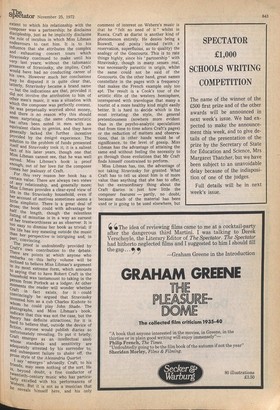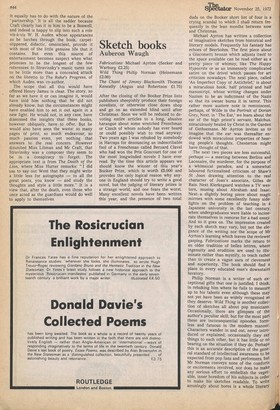Richard Luckett on Stravinsky way out, West
Only Henry James could do justice to the current crop of Stravinskiana," could properly apprehend and adumbrate the manifold ironies of both personal and cultural history that the post-obituary revelations suggest. How Stravinsky came to be floating on that tide that brings the flotsam of decaying civilisation to Hollywood, where the westward drift laps at last against Beverly Hills; how he survived as a composer, and the part played in this by Robert Craft, who metamorphosed from fan to friend to — virtually — adopted son; how in 1959 he embarked, in collaboration with Craft, on what amounted to a second career as critic, memorialist, wit, and preacher of lay sermons; these things, and their aftermath, seem almost to demand the return of the " master of nuance and scruple" to the terrestrial sphere. But perhaps he can be spared that painful re-engagement, for the territory is one that we may traverse already in the maps he has left us and is, in any case, more amusing than edifying.
To take last things first, Themes and Conclusions is presented, to us as Stravinsky's final "work in words." How much of it is truly Stravinsky's is a moot point, and the suspicion that it embodies the very active collaboration of Robert Craft is borne out by Lillian Libman in her account of Stravinsky's last years, and reinforced by the publication of copious extracts from Craft's own diaries. There is no reason to suppose that the composer is misrepresented, or even that the frequent lexical field-days do not have their origin in the conversation of a man who, according to Nicolas Nabokov, spoke Russian with "superb, gourmand-like dexterity" and approached English with an equally catholic palate. But it is hard to accept a great deal of what is printed here as wholly Stravinsky's, and when we hear what is seemingly the authentic voice (Interviewer "How do you feel since your return from the hospital, Mr Stravinsky? ". Stravinsky: " Worse, thank you.") we are irresistibly reminded of Gerard Hoffnung.
The 'private ' personality of an artist is often as much a matter of artifice as any of the works that he creates, and Stravinsky clearly believed, with Chekhov, that nobody should "ever let go of the hold that he has on himself." He rejected the aleatoric approach, in life as in music. Hence his elaborate annotations on books and articles that he felt misrepresented him, his superstition, the array of medicines and the parade of doctors: nothing was left to chance. Hence also, perhaps, the tenacity that kept him alive, creatively as well as physically, for so long. We cannot, then, dismiss out of hand even so strange a confection as Themes and Conclusions, for Craft was accepted by Stravinsky, and Stravinsky was fully aware that "It would be strange indeed if we had not put words into, or helped to get them out of, each other's mouths." The book lacks much of the fire and most of the historical interest of its predecessors, but it still remains as interesting a document of its kind as we are likely to see for a long time. And the thought of Stravinsky, "Kleenex at the ready," preparing to listen to the War Requiem, is an apt reminder that nothing would keep the old man down.
Robert Craft, in his Stravinsky: The Chronicle of a Friendship, emphasises the
extent to which his relationship with the composer was a partnership; he disclaims discipleship, just as he implicitly disclaims the role of incubus in which Miss Libman endeavours to cast him. It is to his influence that she attributes the complex and exhausting concert tours which Stravinsky continued to make until his Very last years; without the talismanic presence of Stravinsky, she implies, Craft would have had no conducting career of his own. However much her conclusions may be disputed it is quite clear that, latterly, Stravinsky became a brand name — but the indications are that, provided it did not involve the attribution to him of Other men's music, it was a situation with Which the composer was perfectly content. He was perpetually worried about money, and there is no reason why this should seem surprising; the same characteristic has often been noted in men with an equivalent claim to genius, and they have gerierallY lacked the further incentive provided by the emigre experience. The solution to the problem of funds presented itself and Stravinsky took it; it is a salient fact of his later years, though one that Miss Libman cannot see, that he was well served. Miss Libman's book is proof enough; out of her love for the composer Comes her jealousy of Craft. For this very reason her book has a certain value. There are always two views of, any relationship, and generally more; Miss Libman provides a clear-eyed view of life in the Stravinsky household, even if h.er account of motives sometimes seems a little simplistic. There is a great deal of dross; the book could with advantage be h.alf the length, though the relentless listing of minutiae is in a way an earnest of her trustworthiness as an observer. It is too easy to dismiss her book as trivial; if the life has any meaning outside the music than her perspective •is intriguing and, in Part, convincing. c The proof is undoubtedly provided by raft's own contribution to the debate. There are points at which anyone who ernb.arks on this hefty volume will be Inclined to believe Miss Libman's argument In Its most extreme form, which amounts saying that to have Robert Craft in the nousehold was tantamount to taking in the Person from Porlock as a lodger. At other n)ornents the reader will wonder whether Craft in fact exists, for it • could Fonvincingly be argued that Stravinsky Invented him as a cub Charles Kinbote to Whom he could play John Shade. The P hotographs, and Miss Libman's book, tindicate that this was not the case, but the ,he°rY has definite attractions, for it is tfilar.d to believe that, outside the device of etIon, anyone would publish diaries so clinfortunately revealing. To put it briefly, raft emerges as an intellectual snob whose standards and sensitivity are adequately attested by his surrender to, and subsequent failure to shake off, the prose style of the Alexandria Quartet. .1 say ' emerges ' advisedly. Craft, to his t.riends, may seem nothing of the sort. He beyond doubt, a fine conductor of 1Wentieth-century music who has particularly excelled with his performances of
ebern. But it is not as a musician that ne reveals himself here, and his only comment of interest on Webern's music is that he "felt no need of it" whilst in Russia. Craft as diarist is another kind of phenomenon entirely. He denies being a Boswell, and posits instead (with a reservation, superfluous, as to quality) the analogy of the Goncourts. This is to rate things highly, since his 'partnership ' with Stravinsky, though in many senses real, was necessarily parasitic in origin, whilst the same could not be said of the Goncourts. On the other hand, great names constellate in the pages with a frequency that makes the French example only too apt. The result is a Cook's tour of the artistic elite of the western hemisphere, interspersed with travelogue that many a tourist of a more healthy kind might easily better. It is hard to decide which is the most irritating: the style, the general pretentiousness (nowhere more evident than in the psycho-analytic speculations that from time to time adorn Craft's pages) or the reduction of matters and observations, that in other hands would be of significance, to the level of gossip. Miss Libman has the advantage of attaining the same end without feeling the necessity to go through those evolutions that Mr Craft finds himself constrained to perform.
Miss Libman has, too, the advantage of not taking Stravinsky for granted. What Craft has to tell us about him is of more value than anything that she has to offer, but the extraordinary thing about the Craft diaries. is just how little the composer features — partly, no doubt, because much of the material has been used or is going to be used elsewhere, but it equally has to do with the nature of the ' partnership.' It is all the sadder because Craft clearly has it in him to be a Boswell, and indeed is happy to slip into such a role vis-a-vis W. H. Auden whose appearances as he lurches through the book, carpetslippered, didactic, omniscient, provide it with most of the little genuine life that it contains. But even this source of entertainment becomes suspect when what promises to be the longest of the few references to Stravinsky's music turns out to be little more than a concealed attack on the libretto to The Rake's Progress, of which Auden was co-author.
The scope that all this would have offered Henry James is clear. The story, so far as we have it or can imagine it, would have told him nothing that he did not already know, but the circumstances might have enabled him to set it out again in a new light. He would not, in any case, have dismissed the insights that these books, however obliquely, have to offer. But he would also have seen the waste: so many pages of print, so much endeavour, so much passion even, yet nothing that answers to the real concern. However disunited Miss Libman and Mr Craft, that Stravinsky was a composer they seem to be in a conspiracy to forget. The appropriate text is from The Death of the Lion, where Miss Hurter remarks: " I did use to say out West that they might write a little less for autographs — to all the great poets, you know — and study the thoughts and style a little more." It is a view that, after the death, even those who once acted as the guardians would do well to apply to themselves.














































 Previous page
Previous page